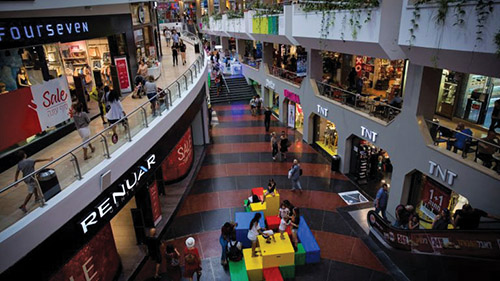
Tel Aviv’s Dizengoff Center mall is one of the indoor locations in which the Navin app can help visitors navigate. Photo by Miriam Alster/FLASH90
Mobile apps like Google Maps and Waze are great when you’re outdoors and your device can connect with the many GPS satellites circling the earth. But once indoors, all that is lost, as GPS signals need “line-of-sight” to connect with your phone.
Tech companies around the world have been trying to solve the problem of indoor navigation using a variety of techniques, from Bluetooth Beacons and WiFi repeaters to dedicated human “mappers.”
Israeli startup Navin has a different idea: Crowdsource the mapping. As with Waze, users with the Navin app installed on their phones passively create detailed indoor maps as they walk.
Navin’s algorithm learns the behavior of its users and employs AI to constantly self-improve, eventually creating an authoritative map to be shared with other Navin users.
With the help of regional “ambassadors,” the Tel Aviv-based company has already mapped key buildings in Israel—including the Dizengoff Center, TLV and Azrieli malls; the Sarona indoor market; Tel Aviv and Ben-Gurion universities; and Tel Aviv Sourasky Medical Center.
Navin has now entered the United States market, starting in the San Francisco Bay Area. Macy’s and Bloomingdales department stores, the San Francisco Municipal Library and the Museum of Modern Art are all ready for Navin app users to receive turn-by-turn walking directions to reach the store, department or faculty they’re looking for, including moving between floors and using escalators or elevators.
Navin was started five years ago by Shai Ronen, a former F-16 combat navigator and Technion computer science graduate who worked in mapping and navigation technology at Israeli companies Elbit, Visionmap and Compugen.
“We have the novel ability to create detailed maps of any building anywhere in the world remotely on our servers, without us ever being in that building,” Ronen told ISRAEL21c in 2018.
Navin has its sights set wide; it also has an office in Hong Kong, a city known for its plethora of buildings and indoor spaces. Hong Kong is also a gateway to many other countries in Asia, Ronen says.
By Brian Blum/Israel21C










